
The newly launched Mahindra BE 6e and XUV 9e have quickly gained attention as two of the carmaker’s most advanced electric SUVs.
Since their unveiling, these models have become some of the most talked-about topics in the EV automotive space. Both vehicles are built on Mahindra’s state-of-the-art INGLO electric platform, ensuring cutting-edge technology and impressive performance.
While the BE 6e and XUV 9e share several key features and performance metrics, it’s essential to understand their differences to determine which EV stands out.
In this article, we will compare the key specifications and features of the Mahindra BE 6e and XUV 9e.
Mahindra BE 6e vs Mahindra XEV 9e: Design and looks
Mahindra BE 6e Design
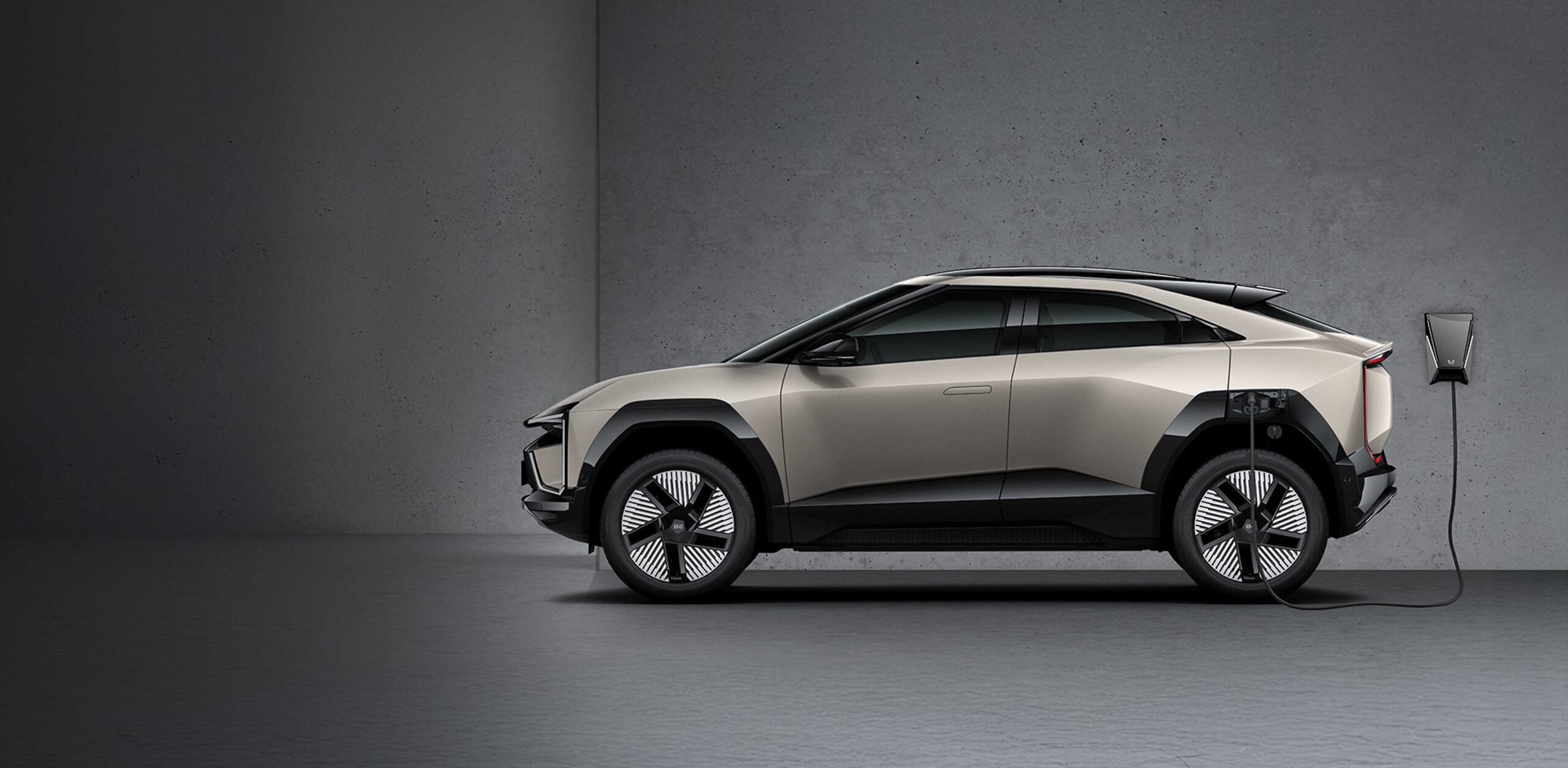 The Mahindra BE 6e stands out with its vertically stacked dual-barrel LED projector headlights and a distinct illuminated ‘BE’ logo on the front.
The Mahindra BE 6e stands out with its vertically stacked dual-barrel LED projector headlights and a distinct illuminated ‘BE’ logo on the front. 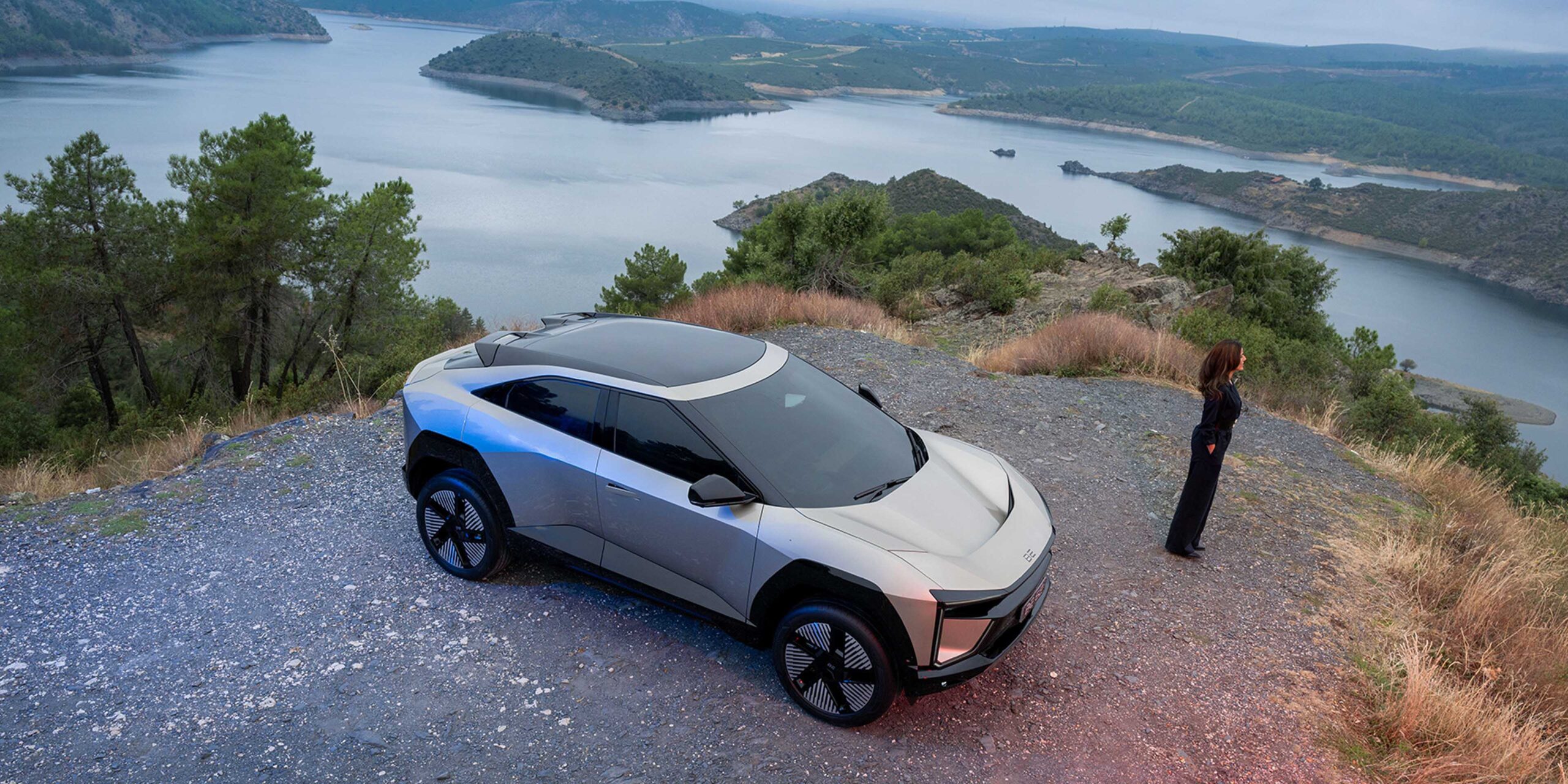
The LED DRLs are C-shaped, enhancing its futuristic look, while the blanked-off grille adds to its EV identity. The lower bumper includes fog lamps and a silver skid plate, giving the BE 6e an aggressive and rugged stance.
At the rear, the BE 6e features C-shaped LED tail lights and a uniquely designed silver skid plate split into two parts. Its rear windshield-mounted spoiler is crafted with a more aggressive aesthetic, perfectly complementing its bold design.
Mahindra XEV 9e Design
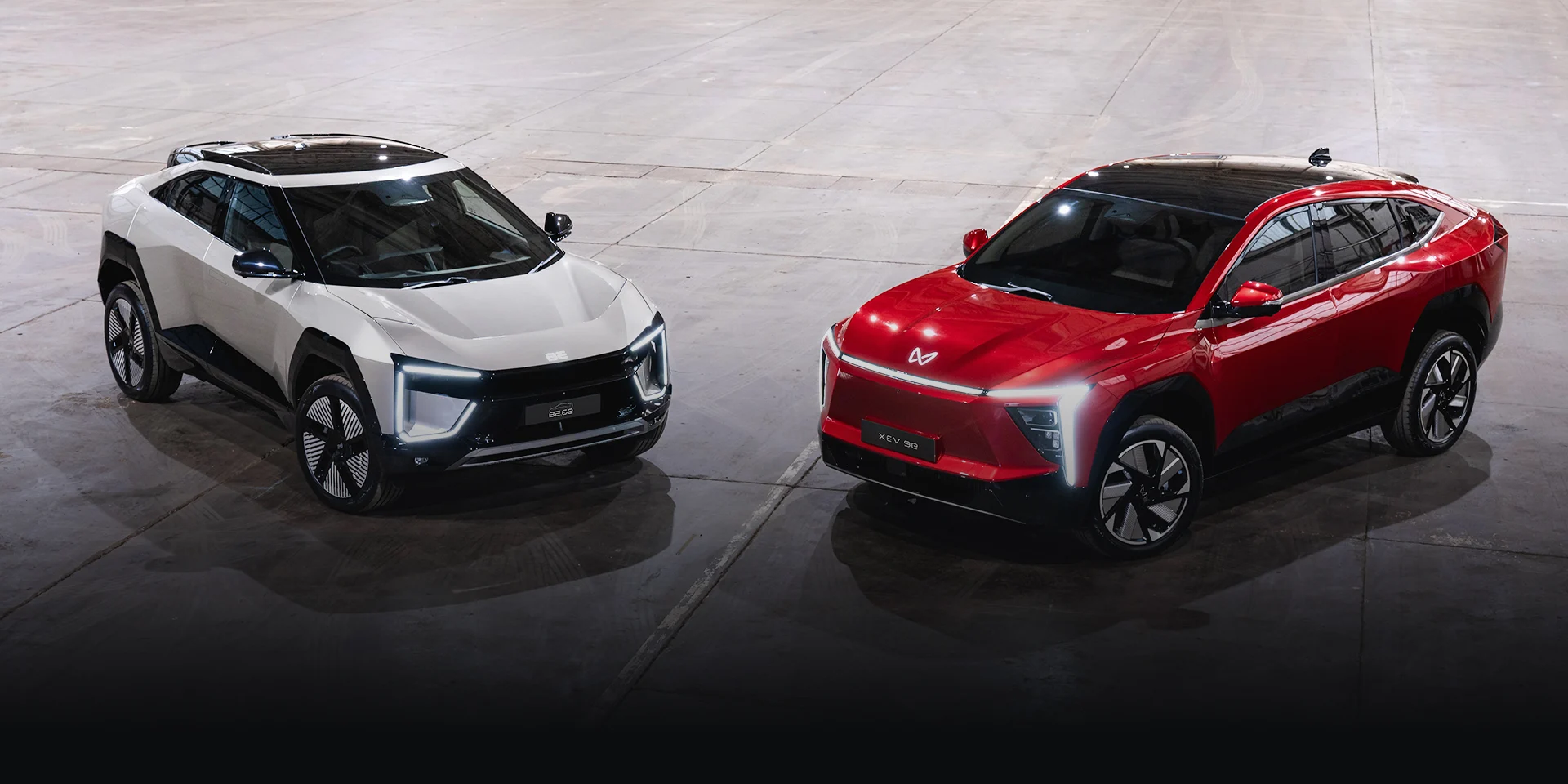 In contrast, the Mahindra XEV 9e showcases a vertical housing setup for its headlights, paired with the distinctive ‘Infinite Possibilities’ logo. The LED DRLs are inverted L-shaped and connected, offering a sleeker appearance.
In contrast, the Mahindra XEV 9e showcases a vertical housing setup for its headlights, paired with the distinctive ‘Infinite Possibilities’ logo. The LED DRLs are inverted L-shaped and connected, offering a sleeker appearance.
Like the BE 6e, it has a blanked-off grille but omits fog lamps on the lower bumper, instead featuring a simpler silver applique.
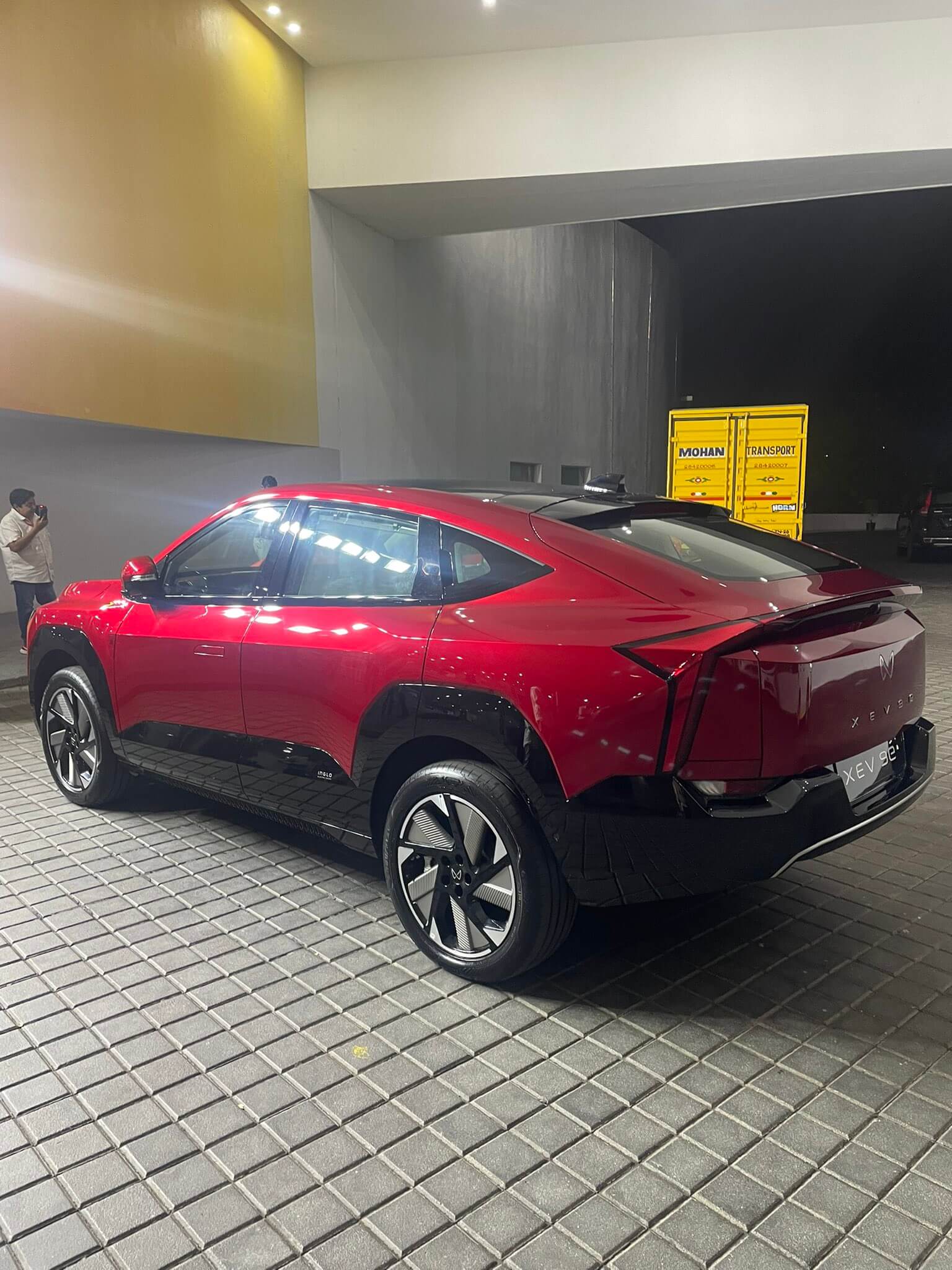 The rear design includes inverted-L-shaped LED tail lights and a clean silver applique on the bumper. The rear windshield-mounted spoiler adopts a subtle look compared to the BE 6e, maintaining a balanced design language.
The rear design includes inverted-L-shaped LED tail lights and a clean silver applique on the bumper. The rear windshield-mounted spoiler adopts a subtle look compared to the BE 6e, maintaining a balanced design language.
Both models share some design similarities, such as flush-fitting door handles at the front, integrated rear door handles on the C-pillar, and 19-inch aerodynamically styled alloy wheels, although with unique patterns for each EV.
Mahindra BE 6e vs Mahindra XEV 9e: Interior
Mahindra BE 6e
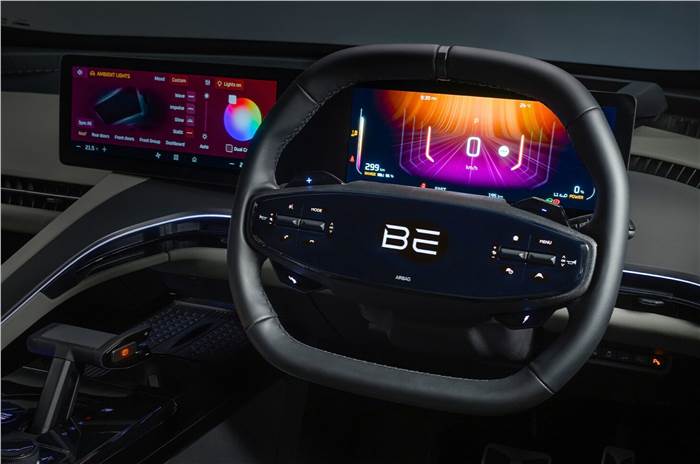 The Mahindra BE 6e offers a dual-tone cabin with a futuristic design and features two large displays on the dashboard. Its 2-spoke steering wheel includes an illuminated logo, complemented by a curved trim that extends from the dashboard to the center console, creating a cockpit-like atmosphere.
The Mahindra BE 6e offers a dual-tone cabin with a futuristic design and features two large displays on the dashboard. Its 2-spoke steering wheel includes an illuminated logo, complemented by a curved trim that extends from the dashboard to the center console, creating a cockpit-like atmosphere.
The drive selector in the BE 6e is inspired by an aircraft, adding a unique touch. The seating features dual-tone fabric and leatherette upholstery, enhancing its premium feel.
Additionally, the BE 6e includes two wireless phone chargers, a 16-speaker Harman Kardon sound system, a panoramic sunroof, a multi-zone AC, and an augmented reality-based heads-up display.
Safety features include 7 airbags, park assist, a 360-degree camera, and a Level 2 Advanced Driver Assistance Systems (ADAS) suite with autonomous emergency braking and driver drowsiness detection.
Mahindra XEV 9
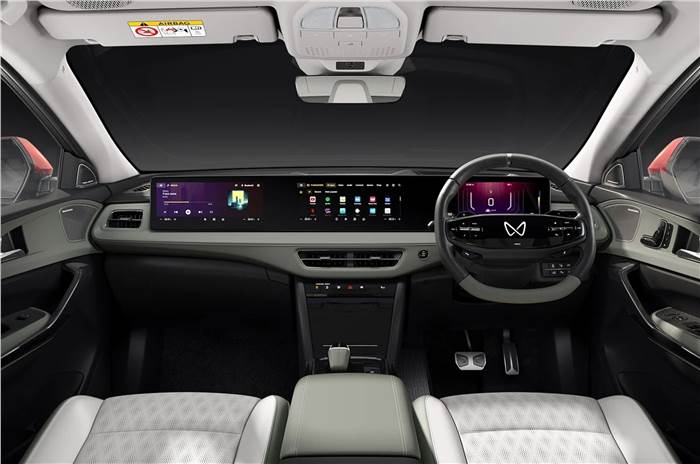 In contrast, the Mahindra XEV 9e takes a more minimalistic approach with its dual-tone cabin and features three 12.3-inch displays on the dashboard, offering a tech-forward look. It shares the same 2-spoke steering wheel with an illuminated logo but lacks the curved trim found in the BE 6e.
In contrast, the Mahindra XEV 9e takes a more minimalistic approach with its dual-tone cabin and features three 12.3-inch displays on the dashboard, offering a tech-forward look. It shares the same 2-spoke steering wheel with an illuminated logo but lacks the curved trim found in the BE 6e.
The center console design is inspired by the Mahindra XUV400 EV, maintaining a simpler aesthetic. The seating uses white leatherette upholstery with black inserts for a sophisticated appearance.
Like the BE 6e, it is equipped with a 16-speaker Harman Kardon sound system, panoramic sunroof, wireless phone charging, multi-zone AC, and an augmented reality-based heads-up display. Safety features are also identical, with 7 airbags, park assist, a 360-degree camera, and a Level 2 ADAS suite offering advanced driving assistance.
Mahindra BE 6e vs Mahindra XEV 9e: Specifications
The BE 6e and XEV 9e share the same battery pack options, motor, and charging capabilities, both running on the INGLO platform with rear-wheel drive configurations.
Equipped with 59 kWh and 79 kWh LFP batteries, the BE 6e offers ranges of 535 km and 682 km, while the XEV 9e delivers 542 km and 656 km (MIDC Phase 1+2).
Both models feature semi-active suspension, three driving modes (Range, Everyday, Race), and identical charging speeds: 20-80% in 20 minutes using a 140kW or 175kW DC fast charger, depending on the battery size.
| Specifications | Mahindra BE 6e (59 kWh) | Mahindra BE 6e (79 kWh) | Mahindra XEV 9e (59 kWh) | Mahindra XEV 9e (79 kWh) |
|---|---|---|---|---|
| Battery Pack | 59 kWh | 79 kWh | 59 kWh | 79 kWh |
| Power | 231 PS | 286 PS | 231 PS | 286 PS |
| Torque | 380 Nm | 380 Nm | 380 Nm | 380 Nm |
| Drivetrain | Rear-wheel drive | Rear-wheel drive | Rear-wheel drive | Rear-wheel drive |
| 0-100 kmph (Claimed) | – | 6.7 seconds | – | 6.8 seconds |
| MIDC Phase 1+2 Range | 535 km | 682 km | 542 km | 656 km |
| DC Fast Charger | 20-80% in 20 minutes with a 140kW charger | 20-80% in 20 minutes with a 175kW charger | 20-80% in 20 minutes with a 140kW charger | 20-80% in 20 minutes with a 175kW charger |
| AC Charger (7.2 kW) | 8.7 hours | 11.7 hours | 8.7 hours | 11.7 hours |
| AC Charger (11 kW) | 6 hours | 8 hours | 6 hours | 8 hours |
Mahindra BE 6e vs Mahindra XEV 9e: Features
Mahindra BE 6e vs Mahindra XEV 9e: Colors
The BE 6e is available in five colors which include:
- Desert Myst
- Everest White Satin
- Firestorm Orange
- Tango Red
- Napoli Black
The XEV 9e is only available in three color options. They are as follows:
- Desert Myst
- Everest White
- Tango Red.
Mahindra BE 6e vs Mahindra XEV 9e: Pricing and Rivals.
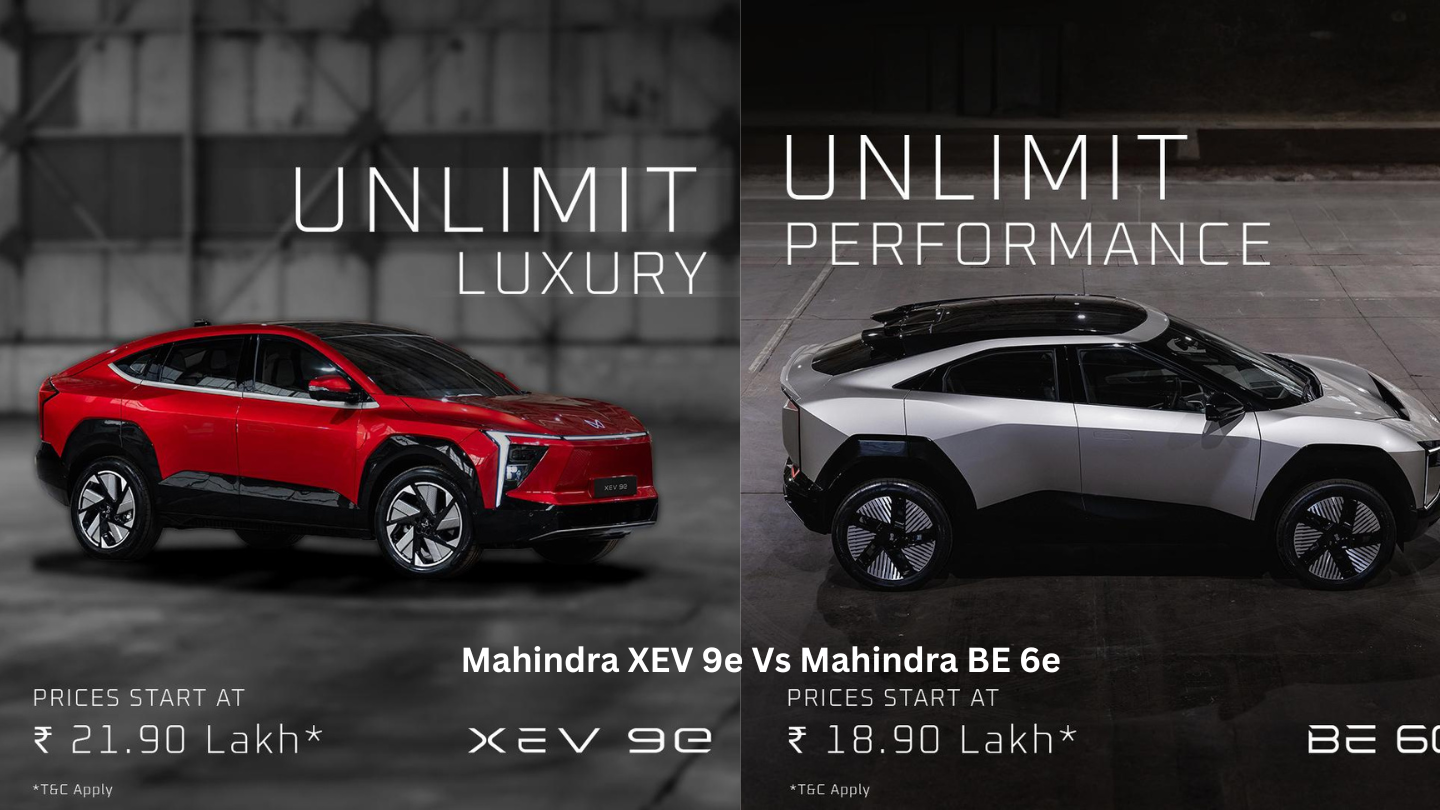 The Mahindra BE 6e starts at ₹18.90 lakh (ex-showroom) and competes with models like the MG ZS EV, Tata Curvv EV, BYD Atto 3, and the soon-to-launch Hyundai Creta EV.
The Mahindra BE 6e starts at ₹18.90 lakh (ex-showroom) and competes with models like the MG ZS EV, Tata Curvv EV, BYD Atto 3, and the soon-to-launch Hyundai Creta EV. Final Thoughts
In conclusion, while the Mahindra BE 6e and XEV 9e share several core features, such as battery options, performance capabilities, and high-tech features, they differ in design, pricing, and overall appeal.
The BE 6e is more aggressive in its design and offers a more affordable price point, making it a great choice for those looking for a bold, compact electric SUV.
The XEV 9e, however, presents a more refined, luxurious appeal with its tech-forward interior and slightly larger range, appealing to those who prioritize comfort and sophistication.
Ultimately, the choice comes down to individual preferences—whether you value striking design and affordability or prefer a premium, feature-rich experience with an extended range.
While both EVs share similar features, their pricing and full performance details are yet to be fully revealed, and we will have to wait until next year to see which model performs better in the competitive automotive market.




